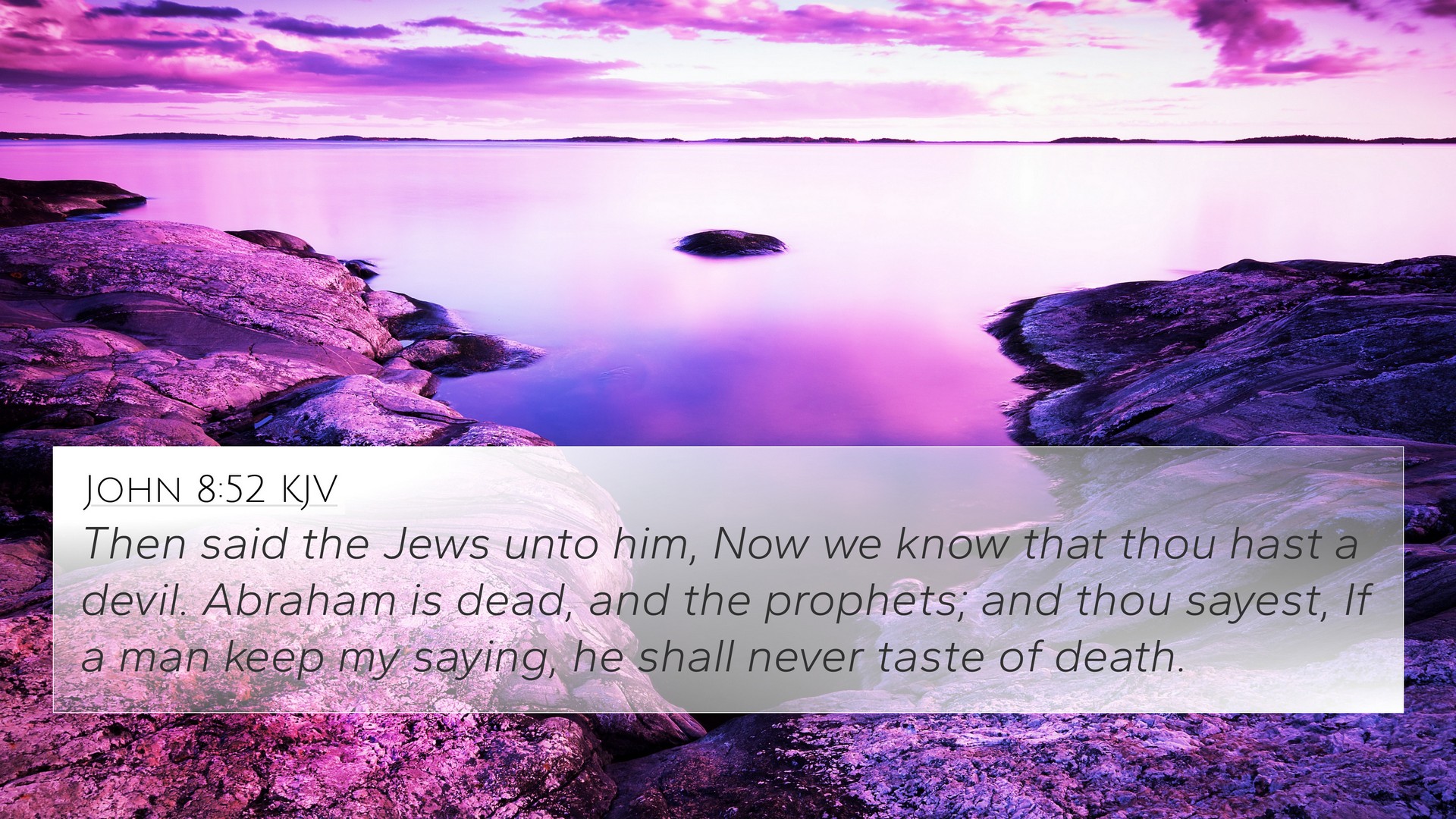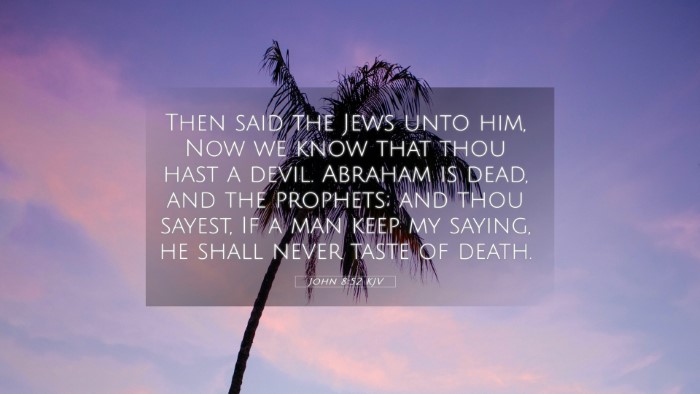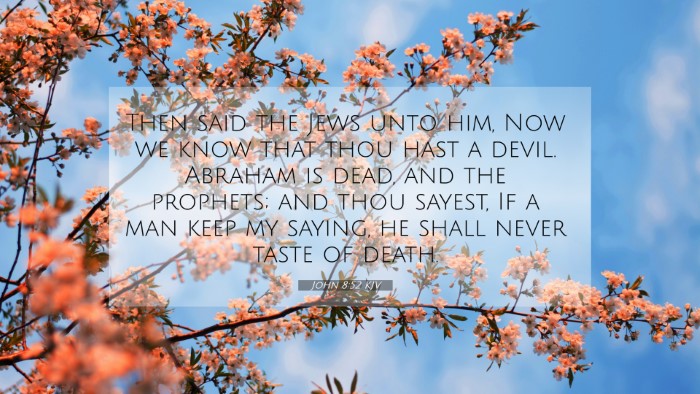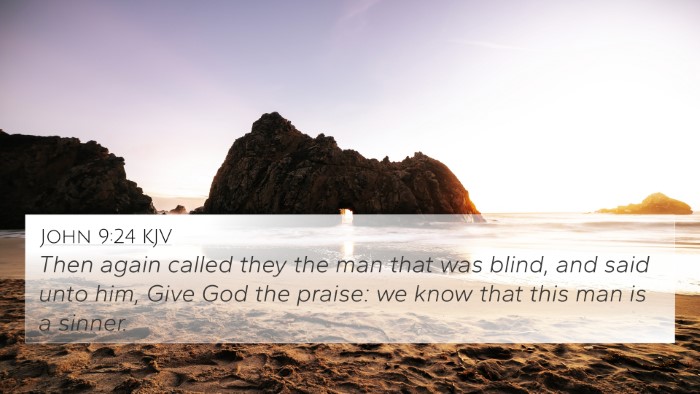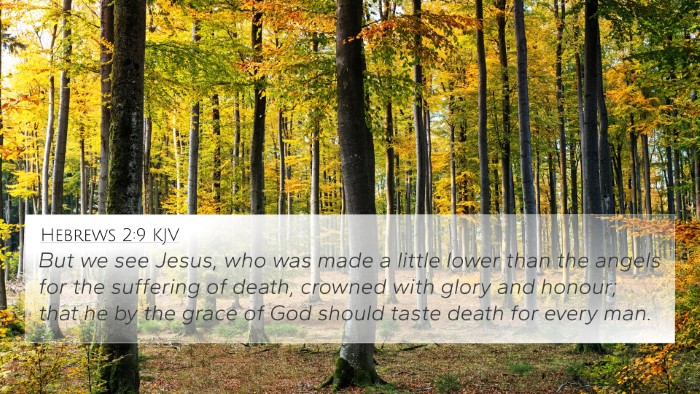Understanding John 8:52
John 8:52 states:
"Then said the Jews unto him, Now we know that thou hast a devil. Abraham is dead, and the prophets; and thou sayest, If a man keep my saying, he shall never taste of death."
Summary of the Verse
This verse showcases a critical moment in Jesus' dialogue with the Jewish leaders, revealing their misunderstanding of His teachings about death and eternal life. The Jews respond skeptically, equating Jesus’ claims about keeping His word to having a demonic influence.
Commentary Insights
Matthew Henry's Commentary
Henry emphasizes the spiritual blindness of the Jewish leaders. They fail to grasp the significance of Jesus' proclamation regarding eternal life and instead rely on external appearances and traditional beliefs. His commentary indicates that Jesus speaks of a death that transcends the physical realm, something the Jews could not comprehend.
Albert Barnes' Notes
Barnes interprets this verse as a pivotal point in Jesus’ ministry, noting how the leaders’ reliance on Abraham's physical lineage conflicts with the spiritual truths Jesus is presenting. Barnes points out that Jesus’ promise of eternal life challenges their assumptions about death and the afterlife, as they respond from a position of disbelief and accusation.
Adam Clarke's Commentary
Clarke highlights the irony present in the Jews' arguments, illustrating their ignorance of the deeper spiritual truths discussed. He acknowledges that Jesus is not referencing physical death but rather a spiritual state that offers freedom from sin and fear, reinforcing the transformative power of His teachings.
Key Themes and Connections
John 8:52 explores themes of spiritual life versus physical death. This concept can be connected to several other scripture passages that encourage deeper reflection on life after death and the nature of spiritual truth:
- John 3:36: “He who believes in the Son has everlasting life...” - This verse reiterates the theme of eternal life through belief in Jesus.
- John 5:24: “Most assuredly, I say to you, he who hears My word and believes in Him who sent Me has everlasting life...” - Here, Jesus affirms the promise of salvation for those who accept His word.
- Romans 6:23: “For the wages of sin is death, but the gift of God is eternal life in Christ Jesus our Lord.” - Paul draws a clear distinction between sin leading to death and God’s gracious gift of eternal life.
- Hebrews 2:9: “But we see Jesus, who was made a little lower than the angels, for the suffering of death, crowned with glory and honor...” - This verse highlights Jesus’ role as the Redeemer who conquers death.
- 1 John 5:11-12: “And this is the testimony: that God has given us eternal life, and this life is in His Son...” - John emphasizes the assurance of eternal life through Jesus, linking directly to Jesus' statements in John 8.
- Matthew 10:28: “And do not fear those who kill the body but cannot kill the soul...” - This further emphasizes the importance of spiritual rather than physical existence.
- Philippians 1:21: “For to me, to live is Christ, and to die is gain.” - Paul expresses the believer's perspective on life and death in Christ.
Cross-Reference Tools and Methods
Cross-referencing Biblical texts can deepen your understanding of scripture. Some tools for effective Bible cross-referencing include the following:
- Bible Concordance: A useful tool for finding specific words or themes within scripture.
- Bible Cross-Reference Guide: Helps to identify passages that relate to the themes and messages of specific verses.
- Cross-Reference Bible Study: A systematic approach that involves studying related verses to glean a comprehensive understanding of a topic.
- How to Use Bible Cross-References: Guidance on identifying and utilizing connections between verses to enhance study.
- Bible Reference Resources: Collections of verses grouped by themes, aiding in the discovery of inter-Biblical dialogues.
Exploring Related Questions
When engaging with John 8:52, consider these reflective questions:
- What verses are related to eternal life?
- How do Jesus' teachings in this passage relate to those found in the Gospels?
- Are there similar themes in the teachings of Paul concerning life and death?
- How do the Old Testament prophecies about life after death connect with Jesus' assertions?
Conclusion
John 8:52 serves as a profound reminder of the dichotomy between spiritual and physical death. Understanding this verse through public domain commentaries provides nuanced insight into the theological implications of Jesus' teachings. By employing tools for Bible cross-referencing, believers can build a more robust understanding of scripture and the intricate links it holds.
